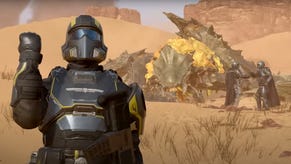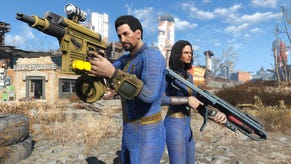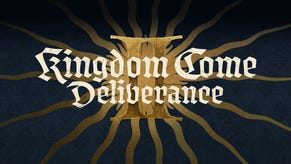State of MMO's nation: WoW's cloying ten-year legacy
With The Secret World launching today and Guild Wars 2 just down the road, it's an exciting time for MMOs. But while indulging in a little light grinding, even a newb like Brenna Hillier couldn't help but feel the long shadow of Azeroth.
If the latest crop of MMOs represent the growth of a genre in the decade since World of Warcraft launched, then I genuinely fear it has stymied. Is this what MMORPGs are reduced to? Catering only to an existing market rather than trying to find new users?
It's been ten years since World of Warcraft debuted and changed the MMORPG space forever. Although games like Ultima Online and Everquest were popular and successful, World of Warcraft is an inarguable cultural phenomenon, hugely influential on gaming and geek culture - and beyond. Want proof? I've never played it, and until recently I'd never even played any kind of MMO, and yet I can reliably bumble along in the language of the scene.
Raids, instances, tanks, DPS, controllers, buffs, LFG; I understand, on an abstract level, how the game is played. World of Warcraft may not have established this gameplay lingua franca but it cemented it, and it remains the giant of the MMORPG world, the touchstone for all others to come. New MMORPGs reference the same themes and schemes; every new MMORPG is designed to be if not a WoW-killer then certainly to attract a portion of its audience; new MMORPGs are designed for World of Warcraft veterans.
The evidence for this is clear in World of Warcraft's competitors. I recently participated in two different MMORPG betas - first Guild Wars 2, and later The Secret World, which EA is releasing today. Loading up the Guild Wars 2 beta was my very first experience with a MMORPG. I chose a Charr character and leapt into the fray - quite literally, as the Charr story begins on a battlefield, which was somewhat stressful given I had no idea how to stop my health bar going down. My contribution was to run into a wall and stand there for 20 minutes while I frantically searched for an online instruction manual.
I am a veteran gamer and I don't need a lot of handholding. If I am playing a game with a keyboard and mouse, certain universal ideas - like WASD - probably don't need explaining. With this in mind I boldly strode forward. And forward. And forward some more - despite how frantically I was wiggling the mouse and expecting it to steer me towards my goal. After a few moments of wretched confusion I figured out that MMORPG characters control like tanks - forward and backward and rotate, a thing I thought we'd merrily jettisoned along with late 90's survival horror. And after some experimentation, that you need to right click and drag the screen to move the camera.
World of tanks
This felt so clunky and awful that it was like the first time, a lifetime ago it seems, that I used twin analog sticks - and spent half the time staring at the sky and the other half at the ground while dashing in a circle. I briefly wondered if I had had a stroke and lost the part of my brain how to play games, or whether the cold in my office had finally destroyed the nerves in my hands.
I immediately contacted a couple of better-experienced types to flag this bizarre control system with them and elicit some sympathy. I received none; Pat was actually struck slightly speechless to think of anybody not knowing how drag the camera as instinctively as they know which button is "jump" or which trigger is "fire". This is something everyone knows because everyone has played World of Warcraft - or a game so like it that the distinction is a matter of aesthetics.
What does it say about the current approach to online RPG design that this background knowledge is assumed right from the get go? If you’re playing an MMO, the games seem to reason, then you must already know how they work. You know how to play an MMORPG because you played World of Warcraft.
What does it say about the current approach to online RPG design that this background knowledge is assumed right from the get go? Guild Wars 2 is aimed very firmly at MMO veterans; there's no denying the messaging and the intent inherent to its design. I had the same experience jumping into The Secret World, though Funcom had at least thought to include a few control prompts and actually fronted a pretty reasonable tutorial section introducing its unusual, classless weapons and powers systems. But even once I overcame my discomfort with the controls in both games I started finding a bunch of other things to be confused about.
Neither makes any effort to teach you how to play an MMORPG. I don't know how or why I'd want to join a group. I don't know what powers and equipment I'm supposed to use. IIf you’re playing an MMO, the games seem to reason, then you must already know how they work. You know how to play an MMORPG because you played World of Warcraft, and from long discussions with MMORPG veterans on this very subject, it seems that every MMORPG produced in its wake has been an attempt to refine, improve upon or succeed it.
So far, none have done so to any great degree. If the latest crop of MMOs represent the growth of a genre in the decade since World of Warcraft launched, then I genuinely fear it has stymied. Is this what MMORPGs are reduced to? Catering only to an existing market rather than trying to find new users?
This isn't to say that The Secret World and Guild Wars 2 will be "bad," obviously. But the question of when we're going to see true innovation in the MMO space has to be asked: it doesn't look as though it's going to be this year.







.jpg?width=291&height=164&fit=crop&quality=80&format=jpg&auto=webp)


